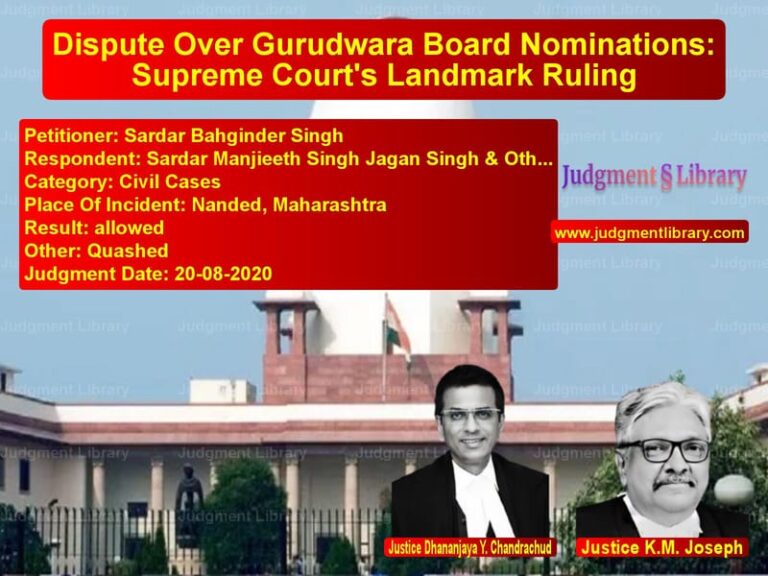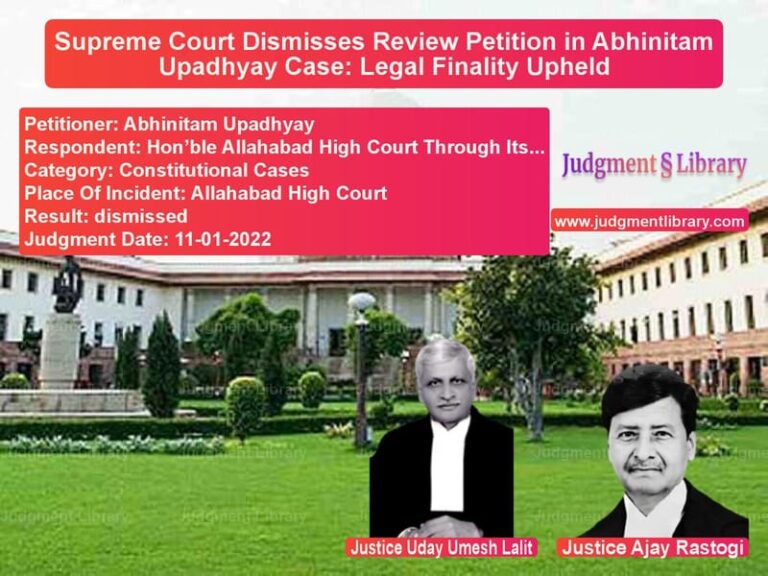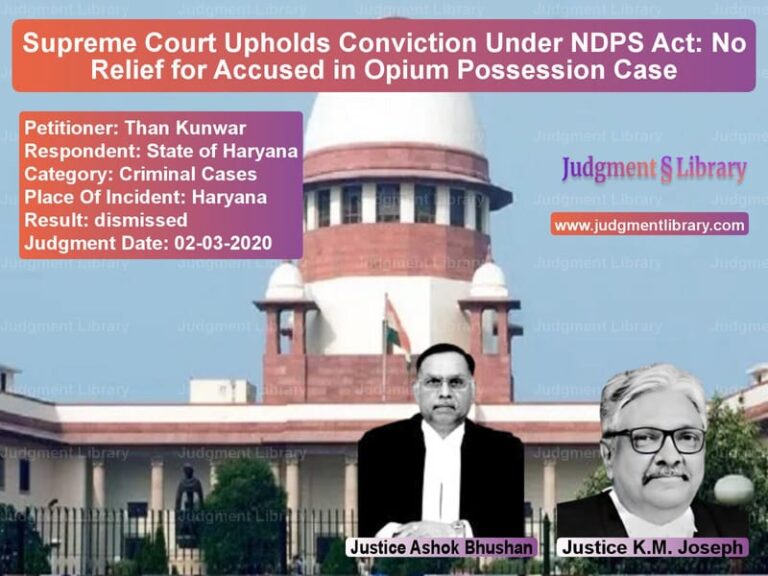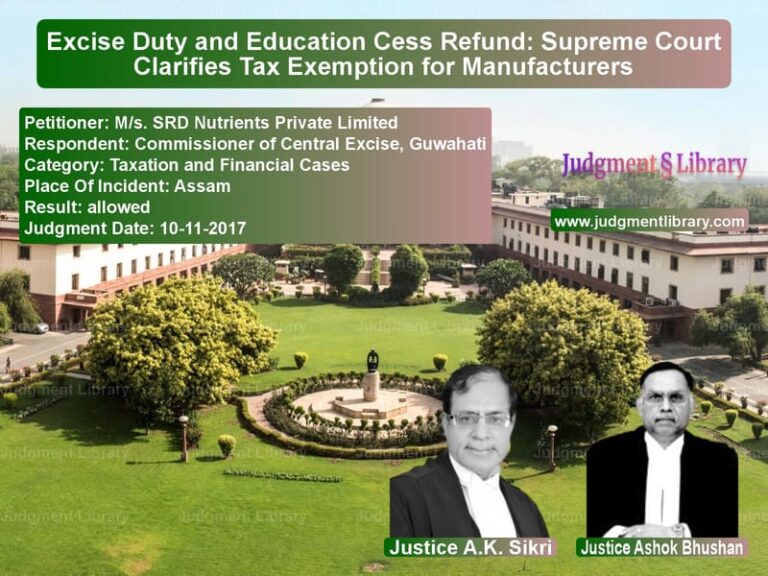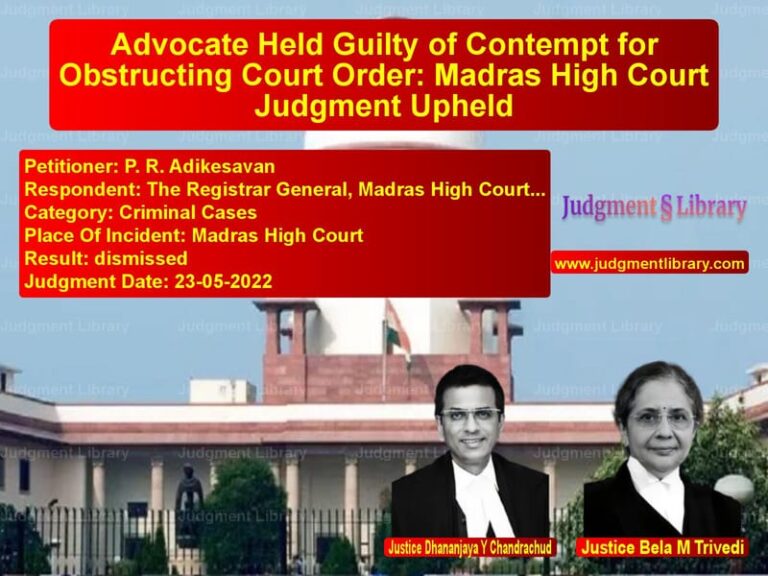Analysis of Sunil Kumar Verma v. State of Bihar: Judicial Appointment and Service Continuity
This case involves an appeal by Sunil Kumar Verma against the High Court of Judicature at Patna’s decision, which dismissed his writ petition challenging his termination from the post of Additional District and Sessions Judge. The appellant, Sunil Kumar Verma, was initially appointed as a Civil Judge (Junior Division) in Uttar Pradesh, before being selected for the position of Additional District and Sessions Judge in Bihar. However, his services were terminated following the judgment in the case of Dheeraj Mor v. High Court of Delhi, which held that advocates cannot apply for the position of Additional District and Sessions Judge under the direct recruitment category if they have already served as judicial officers. The Supreme Court’s judgment focuses on the facts of this particular case, the legal arguments raised, and the decision to quash the appellant’s termination and reinstate him.
Background of the Case
The appellant, Sunil Kumar Verma, had applied for the post of Additional District and Sessions Judge in Bihar after having practiced as an advocate for over seven years. The recruitment process was delayed, and in the meantime, Verma was appointed as a Civil Judge (Junior Division) in Uttar Pradesh. After obtaining the necessary permission, he participated in the selection process for the post in Bihar and was selected. Following his selection, he resigned from the Uttar Pradesh judiciary and joined Bihar’s Superior Judicial Services in August 2018. However, in February 2020, the judgment in the Dheeraj Mor case led to a review of Verma’s appointment. The High Court issued a show-cause notice for the termination of his services, and ultimately, his appointment was canceled in December 2020. The appellant challenged this termination in the High Court, which dismissed his petition. Verma then filed an appeal before the Supreme Court.
Petitioner’s Arguments
Sunil Kumar Verma presented several arguments in support of his appeal:
- Eligibility at the Time of Application: The appellant argued that the eligibility of a candidate should be assessed at the time of application. Since he was an advocate with over seven years of experience when he applied for the position, he contended that he was eligible for direct recruitment under the rules in place at that time.
- Distinction from Dheeraj Mor Case: Verma argued that the facts of his case were different from those in the Dheeraj Mor case. While the Dheeraj Mor case prohibited advocates who had already been judicial officers from applying for the post of Additional District and Sessions Judge, Verma was not in service as a judicial officer when he applied. Thus, he claimed that the judgment in Dheeraj Mor did not apply to his case.
- Permission to Resign: Verma highlighted that he had obtained permission from the High Court of Judicature at Allahabad before participating in the Bihar recruitment process. Furthermore, he had followed the proper procedure by seeking permission before resigning from the Uttar Pradesh judiciary to join the Bihar judiciary.
- Vigilance in Seeking Remedies: Verma pointed out that he was vigilant and proactive in seeking permission and following the rules, unlike the appellant in the Dheeraj Mor case, who had violated the conditions. Therefore, Verma argued that his actions were in good faith, and his termination should not stand.
Respondent’s Arguments
The respondents, including the High Court of Patna and the State of Bihar, presented several counter-arguments in defense of the termination:
- Application of Dheeraj Mor Judgment: The respondents argued that the judgment in the Dheeraj Mor case was applicable to Verma’s situation. They contended that regardless of whether Verma was already a judicial officer at the time of his application, the principle of the Dheeraj Mor case applied, and Verma’s eligibility for the post was compromised by his previous judicial service.
- Lack of Jurisdiction: The respondents emphasized that Verma was serving in Uttar Pradesh when he applied for the Bihar post. As such, they argued that his application was contrary to the rules, which required candidates to be in service with the Bihar judicial system to apply.
- Merit of the Case: The respondents further argued that while Verma had been selected based on merit, the termination was not arbitrary or unlawful. They claimed that the appointment process had to follow the principles outlined in Dheeraj Mor and that Verma’s resignation from Uttar Pradesh should not have allowed him to apply for the Bihar post.
The Court’s Reasoning
The Supreme Court, after reviewing the case, made several critical observations:
- Eligibility at the Time of Application: The Court agreed with Verma’s argument that eligibility should be assessed at the time of application. Since he was an advocate with over seven years of experience when he applied for the post, the Court found that his application was valid under the rules at that time.
- Distinction from Dheeraj Mor Case: The Court found that the facts of Verma’s case differed significantly from those in Dheeraj Mor. In the Dheeraj Mor case, the candidate had already served as a judicial officer before applying, whereas Verma had not been serving as a judicial officer when he applied for the Bihar post. The Court held that the Dheeraj Mor judgment was not applicable in Verma’s case.
- Role of Permission to Resign: The Court also noted that Verma had followed due process by obtaining permission from the High Court of Allahabad before resigning from the Uttar Pradesh judiciary. The Court found no fault in Verma’s conduct, which further supported his case for reinstatement.
- Vigilance in Seeking Remedies: The Court appreciated Verma’s vigilance in seeking remedies and following the legal procedure. The Court noted that Verma’s actions were consistent with the rules and that his termination should not be upheld given the circumstances.
The Court’s Decision
The Supreme Court ruled in favor of Sunil Kumar Verma, making the following orders:
- Quashing of Termination: The Court quashed the termination of Verma’s services by the High Court of Patna and the State of Bihar. The Court held that the termination was not justified based on the facts of the case.
- Reinstatement: Verma was directed to be reinstated to his position as Additional District and Sessions Judge in Bihar forthwith, or at least within two weeks from the date of the judgment.
- Continuity in Service: The Court ordered that Verma’s continuity in service, including seniority and terminal benefits, should be maintained. However, the Court clarified that he would not be entitled to emoluments for the period during which he was out of employment.
Conclusion
This case highlights the importance of ensuring that the principles of eligibility and merit are strictly adhered to in judicial appointments. The Court’s decision to reinstate Sunil Kumar Verma is based on the understanding that his application was valid at the time of submission and that he followed the due process required for the appointment. The case also emphasizes the significance of judicial oversight in ensuring that the laws and rules governing recruitment and appointments are applied fairly and justly.
Petitioner Name: Sunil Kumar Verma.Respondent Name: State of Bihar and Others.Judgment By: Justice B.R. Gavai, Justice C.T. Ravikumar.Place Of Incident: Bihar.Judgment Date: 12-09-2022.
Don’t miss out on the full details! Download the complete judgment in PDF format below and gain valuable insights instantly!
Download Judgment: sunil-kumar-verma-vs-state-of-bihar-and-o-supreme-court-of-india-judgment-dated-12-09-2022.pdf
Directly Download Judgment: Directly download this Judgment
See all petitions in Employment Disputes
See all petitions in Promotion Cases
See all petitions in Disciplinary Proceedings
See all petitions in Public Sector Employees
See all petitions in Judgment by B R Gavai
See all petitions in Judgment by C.T. Ravikumar
See all petitions in allowed
See all petitions in supreme court of India judgments September 2022
See all petitions in 2022 judgments
See all posts in Service Matters Category
See all allowed petitions in Service Matters Category
See all Dismissed petitions in Service Matters Category
See all partially allowed petitions in Service Matters Category


